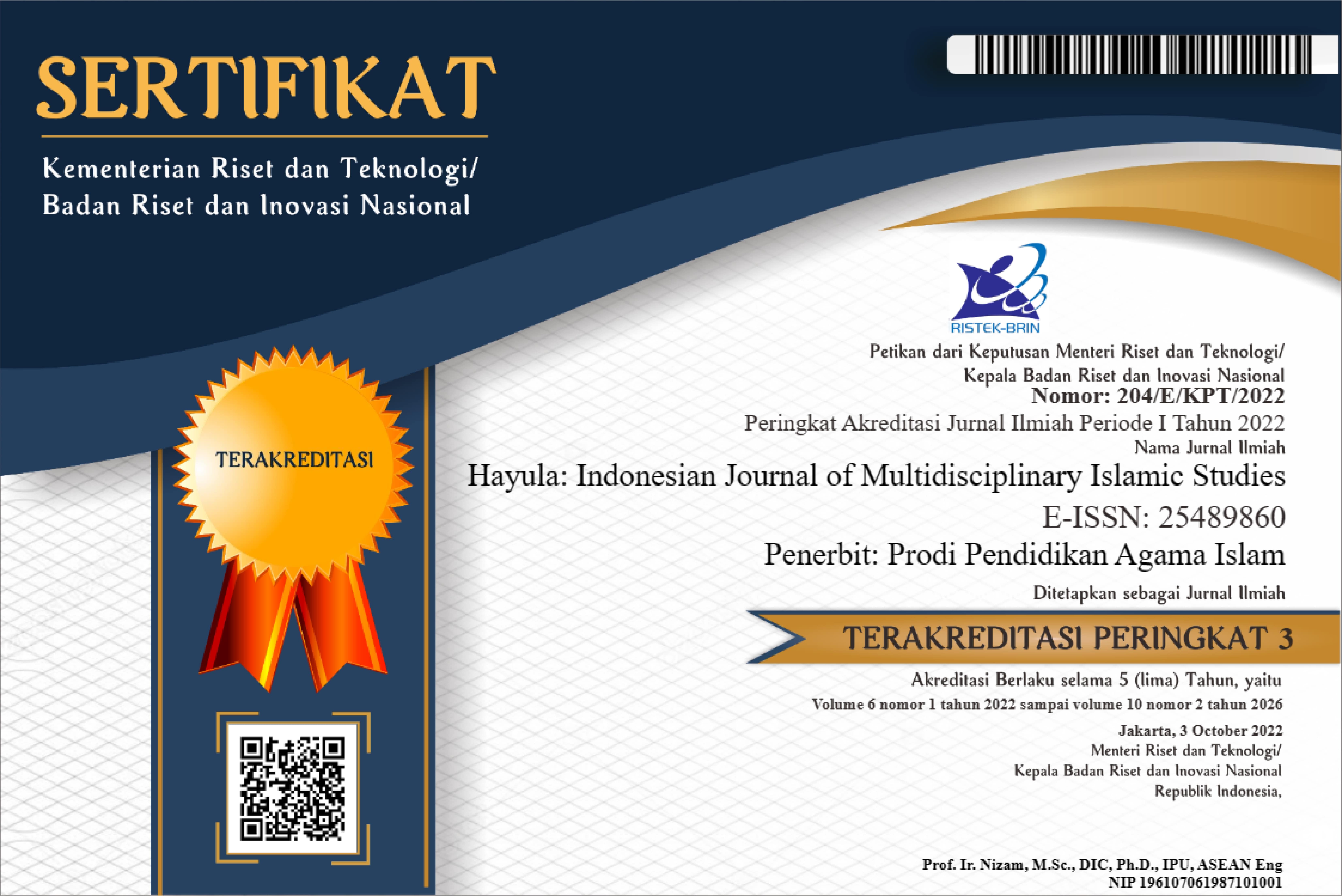From Politics to Education: Nurcholish Madjid and The Reform of Education in Indonesia
DOI:
https://doi.org/10.21009/003.1.02Keywords:
Nurcholish Madjid, Reform, Islamic EducationAbstract
This paper attempts to understand Nurcholish Madjid’s Islamic education reform. After the death of Nurcholish Madjid, his education appears as a significant human capital investment which might become the instrument which constantly keep Nurcholish Madjid’s legacies alive, developed, and disseminated through times. Apart from this fact, Nurcholish Madjid’s Islamic education reform has not been yet the main focus of previous researches. Focusing on Nurcholish Madjid’s Islamic education reform, this paper looks at the educational activities of Nurcholish Madjid mainly in IAIN-UIN Jakarta and Paramadina. In this regards, this paper investigates Nurcholish Madjid’s Islamic education reform and the contexts within which it was developed. This investigation provides an insight to the discussion of the subject which tries to answer the questions of what kind of ideas which were developed by Nurcholish Madjid to reform Islamic education in Indonesia; how he defined, interpreted, and applied the ideas for the development of Islamic education in Indonesia. Eventually this paper suggests that in teaching and understanding Islam, Nurcholish Madjid obviously treated Islam not only as a religion, but also as a historical, sociological, and anthropological phenomenon which must be studied in an open, democratic, participatory, pluralistic, and inclusive way.
References
Ali, F. (2005). Mengenang Cak Nur. In M. W. Rifki, Kesaksian Intelektual: Mengiringi Kepergian Sang Guru Bangsa. Jakarta: Paramadina.
Ali, M. (2005 ). Mengenang Nurcholish Madjid sebagai Guru Bangsa. In M. W. Rifki, Kesaksian Intelektual: Mengiringi Kepergian Sang Guru Bangsa. Jakarta: Paramadina.
Bakti, A. F. (2004). Paramadina and Its Approach to Culture and Communication: An Engagement in Civil Society. Archipel: Études Interdisciplinaires sur le Monde Insulindie(68).
Bakti, A. F. (2005). Islam and Modernity: Nurcholish Madjid’s Interpretation of Civil Society, Pluralism, Secularization, Democracy. Asian Journal of Social Science,, 33(3).
Barton, G. (1997). Indonesia’s Nurcholish Madjid and Abdurrahman Wahid as Intellectual ‘Ulama’: The Meeting of Islamic Traditionalism and Modernism in Neo-Modernist Thought. Studia Islamika, 4(1).
Barton, G. (1999). Gagasan Islam Liberal di Indonesia: Pemikiran Neo-Modernisme Nurcholish Madjid, Djohan Effendi, Ahmad Wahib, dan Abdurrahman Wahid (trans). Jakarta: Paramadina.
Bruinessen, M. v. (2006). Nurcholish Madjid: Indonesian Muslim Intellectual. ISIM Newsletter, p. 17.
Bruinessen, M. v. (2006). Nurcholish Madjid: Indonesian Muslim Intellectual. ISIM Newsletter, 17.
Darmadi, D. (2000). Urban Sufism: The New Flourishing Vivacity of Contemporary Indonesian Islam. Studia Islamika, 7(3).
Hasan, N. (2000). In Search of Identity: The Contemporary Islamic Communities in Southeast Asiaâ€, i. Studia Islamika, 7(3).
Hasballah, M. (2000). Cultural Presentation of the Muslim Middle Class in Contemporary Indonesia. Studia Islamika, 7(2).
Hefner, R. W. (1993). Islam State and Civil Society: ICMI and the Struggle for the Indonesian Middle Classâ€, . Indonesia.
Hidayat, K. (2005). “Cak Nur yang Saya Kenalâ€, in: Muhammad Wahyuni Nafis & Achmad Rifki, Kesaksian Intelektual: Mengiringi Kepergian Sang Guru Bangsa. Jakarta: Paramadina.
Jabali, F., & Jamhari. (2002). IAIN dan Modernisasi Islam di Indonesia (eds. Ciputat: Logos, Wacana Ilmu dan Pemikiran.
Kull, A. (2005). Piety and Politics: Nurcholish Madjid and His Interpretation of Islam in Modern Indonesia. Tryek: KFS i Lund AB.
Kuntowijoyo, e. a. (2003). Begawan Jadi Capres: Cak Nur Menuju Istana. Jakarta: KPP Kelompok Paramadina.
Latif, Y. (2005). The Rupture of Young Muslim Intelligentsia in the Modernization of Indonesia. Studia Islamika: Indonesian Journal for Islamic Studies, 12(3).
Liddle, R. W. (2005). Revolusi Nurcholish Madjid . In M. W. Rifki, Kesaksian Intelektual: Mengiringi Kepergian Sang Guru Bangsa. Jakarta: Paramadina.
Madjid, N. (1979). The Issue of Modernization among Muslim in Indonesia: From a Participant’s Point of View (2003) . In R. H. Ali-Fauzi, TheTrue Face of Islam Essays on Islam and Modernity in Indonesia. Ciputat: Voice Cent.
Madjid, N. (1987). Islam Kemodernan dan Keindonesiaan. Bandung: Mizan.
Madjid, N. (2002). (2002), Atas Nama Pengalaman Beragama dan Berbangsa di Masa Transisi: Kumpulan Dialog Jumat di Paramadina. Jakarta: Paramadina.
Madjid, N. (2003). Pesan-Pesan Takwa Nurcholish Madjid: Kumpulan Khutbah Jum’at di Paramadina. Jakarta: Paramadina.
Madjid, N. (2005). Islam Doktrin dan Peradaban: Sebuah Telaah Kritis tentang Masalah Keimanan, Kemanusiaan, dan Kemoderenan. Jakarta: Paramadina.
Madjid, N. (2006). Investasi Kemanusiaan adalah Pendidikan . In B. Munawar-Rachman, , Ensiklopedi Nurcholish Madjid: Pemikiran Islam di Kanvas Peradaban, Jakarta: Yayasan Wakaf Paramadina,. Jakarta: Center for Spirituality and Leadership (CSL), and Mizan.
Magnis-Suseno, F. (2005). Terima Kasih, Cak Nur! . In M. W. Rifki, Kesaksian Intelektual: Mengiringi Kepergian Sang Guru Bangsa. Jakarta: Paramadina.
Rahardi, F. (2005). Warisan Pluralis Sang Guru Bangsa. In Muhammad Wahyuni Nafis & Achmad Rifki, Kesaksian Intelektual: Mengiringi Kepergian Sang Guru Bangsa. Jakarta: Paramadina.
Rahman, F. (1982). Islam & Modernity: Transformation of an Intellectual Tradition . Chicago & London: The University of Chicago Press.
Saleh, F. (2001). Modern Trends in Islamic Theological Discourse in 20th Century Indonesia. Leiden, Boston, and Koln: Brill.
Steenbrink, K. (1996). Recapturing the Past: Historical Studies by IAIN Staff. In Mark R. Woodward, Towards New Paradigm: Recent Developments in Indonesian Islamic Thought. Arizona State University: Program for Southeast Asian Studies, Tempe, Arizon.
Urbaningrum, A. (2005). Nurcholish Madjid, dari Jombang untuk Indonesia. In Muhammad Wahyuni Nafis & Achmad Rifki, Kesaksian Intelektual: Mengiringi Kepergian Sang Guru Bangsa. Jakarta: Paramadina.
Downloads
Published
How to Cite
Issue
Section
License
Authors who publish with this Journal agree to the following terms:
- Author retain copyright and grant the journal right of first publication with the work simultaneously licensed under a creative commons attribution licensethat allow others to share the work within an acknowledgement of the work’s authorship and initial publication of this journal.
- Authors are able to enter into separate, additional contractual arrangementfor the non-exclusive distribution of the journal’s published version of the work (e.g. acknowledgement of its initial publication in this journal).
- Authors are permitted and encouraged to post their work online(e.g. in institutional repositories or on their websites) prior to and during the submission process, as it can lead to productive exchanges, as well as earlier and greater citation of published works.
Users/public use of this website will be licensed to CC BY






